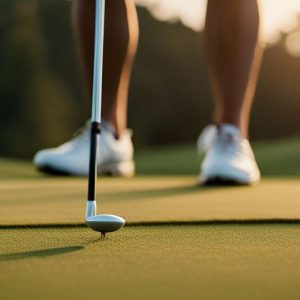Ensuring precision and accuracy in your golf swing is crucial for success on the course. Whether you’re a beginner or a seasoned pro, honing your skills and fine-tuning your swing will make all the difference in your game. In this blog post, we’ll explore the importance of accuracy in golf and provide you with tips and techniques to improve your swing and enhance your overall performance.
When it comes to golf, every aspect of your swing, from the grip to the follow-through, can make or break your shot. A lack of accuracy can result in missed shots, lost strokes, and frustration on the course. However, with the right adjustments and dedication to fine-tuning your technique, you can dramatically improve your accuracy and take your game to the next level. So, let’s dive in and explore how you can refine your golf swing for optimal precision and success.
Key Takeaways:
- Consistency: Fine-tuning your golf swing is crucial for achieving accuracy and consistency in your shots. Small adjustments in your technique can make a big difference in your performance on the course.
- Attention to Detail: Paying attention to the finer points of your swing, such as grip, stance, and alignment, can greatly impact the accuracy of your shots. Taking the time to refine these aspects of your game can lead to improved results.
- Practice: Achieving accuracy in your golf swing requires consistent practice and dedication. By honing your skills on the driving range and working with a coach or instructor, you can make significant improvements to your accuracy and overall game.
Fundamental Elements of an Accurate Swing
The key to a consistently accurate golf swing lies in mastering the fundamental elements of the swing. These elements include the grip, stance, movement, and follow-through. By honing these foundational aspects of your swing, you can improve your accuracy and take your game to the next level. To help you become more consistent in your golf game, you can check out these 14 Proven Tips to Become More Consistent in Golf.
The Role of Grip in Accuracy
One of the most fundamental elements of an accurate golf swing is the grip. Proper grip ensures that the clubface is square at impact, leading to more accurate shots. Your grip should be firm yet relaxed, with your hands working together as a unit. Make sure the ‘V’ formed by your thumb and index finger points towards your trail shoulder for a strong, consistent grip.
Correct Stance and Posture
Your stance and posture play a crucial role in the accuracy of your swing. Your feet should be shoulder-width apart, with your weight evenly distributed between them. Your spine should be straight, and your arms should hang naturally. The correct posture ensures that you have a solid foundation for your swing, allowing you to generate power and accuracy.
The Right Movement
When it comes to the movement of your swing, the key is to maintain a smooth and controlled motion. Rushing the swing or over-swinging can lead to inconsistency and inaccuracy. Focus on a gradual backswing, maintaining a steady tempo, and a smooth transition from backswing to downswing. This will help you maintain control and precision in your shots.
Importance of Follow-Through
Many golfers overlook the follow-through, but it is a crucial element in achieving accuracy. A complete and balanced follow-through ensures that you have delivered the club to the ball with precision. It also helps in generating power and control throughout the entire swing. Pay attention to your follow-through to improve the accuracy of your shots.
Mechanics of a Golf Swing
To achieve an accurate and powerful golf swing, you need to understand the mechanics behind it. Your swing should be a smooth, coordinated movement that involves the entire body. It starts with the grip and stance, followed by the backswing, downswing, and ultimately the follow-through. Each of these elements plays a crucial role in determining the outcome of your shot. Understanding and mastering these mechanics is essential for improving your golf game.
Breakdown of the Golf Swing
Breaking down the golf swing into its individual components can help you identify areas for improvement. The grip and stance are the foundation of your swing, providing stability and control. As you transition into the backswing, your body should rotate while maintaining a balanced position. The downswing is where the power is generated, as you transfer your weight and release the club at the right moment. Finally, the follow-through should be a natural extension of the swing, promoting accuracy and distance. Analyzing each phase of your swing can help you pinpoint any weaknesses and work on improving them.
Importance of Proper Tempo
When it comes to your golf swing, the tempo is crucial. The rhythm and timing of your swing can greatly influence the outcome of your shot. A smooth and controlled tempo allows you to maintain balance and coordination throughout the swing. Rushing your swing can lead to loss of control and accuracy, while a slow tempo may result in a lack of power. Finding the right tempo for your swing is essential for maximizing both distance and accuracy. Remember, a consistent and rhythmic tempo will lead to more consistent results on the course.
How to Achieve Balanced Weight Distribution
One of the key elements of a successful golf swing is achieving balanced weight distribution. Throughout your swing, you should strive to maintain a stable and balanced posture. Your weight should shift from the back foot to the front foot as you go through the swing. Proper weight transfer allows you to generate power and maintain control, leading to a more accurate and consistent ball flight. Focus on keeping your body centered and avoid leaning too far in any direction. Improper weight distribution can lead to mishits and inconsistency in your shots, so mastering this aspect is crucial for improving your golf swing.
Common Swing Mistakes
After fine-tuning your golf swing, it’s important to be aware of common swing mistakes that can hinder your progress on the course. These errors can affect the accuracy and distance of your shots, ultimately impacting your overall performance. By recognizing and addressing these mistakes, you can take your game to the next level and enjoy improved results on the green.
Over Swinging Errors
One of the most common swing mistakes is over-swinging. This occurs when you try to generate power by swinging too hard and too fast, often resulting in a loss of control and accuracy. When you over-swing, you also increase the likelihood of mishitting the ball, leading to inconsistent shots. To avoid this error, focus on maintaining a smooth and fluid swing, rather than forcing power through excessive force. Remember, it’s the precision of your swing, not the strength, that determines the accuracy and distance of your shots.
Wrong Direction Errors
Another common mistake is incorrect alignment and direction. Your swing may be on point, but if your body and clubface are not properly aligned with your target, your shot can end up off course. This can result in frustration and unnecessary strokes on the scorecard. Be sure to consistently check your alignment and adjust as needed to ensure that your swing is leading to the right direction. Pay attention to your set-up and ensure that you are aiming in the direction you want the ball to go.
Lack of Distance Errors
If you find that your shots consistently fall short of the target, you may be making a common distance-related mistake. This could be due to a lack of power in your swing, improper ball position, or inadequate follow-through. By addressing these issues and making necessary adjustments, you can begin to see improvements in the distance and overall trajectory of your shots. Focus on generating power from the right sources, maintaining the correct ball position, and completing your swing with a full and controlled follow-through.
Posture Mistakes
Your posture plays a critical role in the success of your golf swing. Poor posture can lead to a multitude of swing mistakes, including inconsistent ball contact, loss of power, and increased risk of injury. Proper posture involves a straight back, slightly bent knees, and a relaxed stance to allow for a fluid and balanced swing. Ensure that you maintain a solid posture throughout your swing, as it sets the foundation for a successful shot. Practice good posture both on and off the course to reinforce proper habits and improve your overall performance.
Techniques for Improving Accuracy
Now that you understand the importance of accuracy in your golf swing, let’s dive into some specific techniques that can help you fine-tune your game and improve your overall accuracy on the course.
Using Training Aids
One way to improve your accuracy is by using training aids designed to help you refine your golf swing. These aids can help you develop a more consistent and precise swing by providing feedback and guidance on your technique. Whether it’s a swing trainer, alignment sticks, or a practice net, these tools can help you identify and correct any flaws in your swing, ultimately leading to better accuracy on the course. By incorporating these aids into your practice routine, you can drastically improve your swing mechanics and overall precision.
Quality Practice Regimes
When it comes to improving accuracy, the quality of your practice is just as important as the quantity. Instead of mindlessly hitting ball after ball at the driving range, focus on deliberate practice that targets your weaknesses. This could involve breaking down your swing into smaller components, working on your tempo and rhythm, and practicing specific shots that challenge your accuracy. By implementing a focused and purposeful practice regime, you can make significant improvements to your swing accuracy and overall performance on the course.
Professional Lessons and Coaching
While practicing on your own can be beneficial, sometimes you need the expertise of a professional to help you refine your technique and improve your accuracy. Investing in professional lessons or coaching can provide you with personalized feedback and guidance that is tailored to your specific needs. A professional instructor can help you identify any flaws in your swing, provide you with corrective feedback, and offer valuable tips and techniques to elevate your accuracy to the next level. By receiving expert guidance, you can make significant strides in improving your overall accuracy and performance on the golf course.
Mental Aspect of Swing Accuracy
Your mental state plays a critical role in the accuracy of your golf swing. It is not just about physical technique; your mindset can greatly influence the outcome of each shot. Developing mental toughness, visualizing the swing, and overcoming fear of mistakes are key aspects of honing your mental game.
Developing Mental Toughness
Developing mental toughness is essential for achieving accuracy in your golf swing. When faced with challenging shots or difficult conditions, mental toughness enables you to stay focused, resilient, and confident. To build mental toughness, practice positive self-talk, maintain composure under pressure, and learn to adapt to unexpected situations on the course. Embracing challenges and setbacks as opportunities for growth can help you develop the mental resilience required for a consistent and accurate golf swing.
Visualizing the Swing
Visualizing the ideal golf swing can significantly enhance your accuracy on the course. Visualization allows you to mentally rehearse each aspect of your swing, from setup and alignment to the full follow-through. By vividly picturing the entire sequence of your swing, you can create a blueprint for your body to follow. This mental imagery helps reinforce the muscle memory necessary for a precise and repeatable swing, ultimately improving your accuracy and performance on the course.
Overcoming Fear of Mistakes
Overcoming the fear of making mistakes is crucial for achieving accuracy in your golf swing. Fear and anxiety can lead to hesitation, which in turn disrupts the smooth execution of your swing. Overcoming this fear involves accepting that mistakes are a natural part of the game and an opportunity to learn and improve. By shifting your focus from avoiding mistakes to embracing the challenge, you can free yourself from unnecessary mental constraints and allow your natural ability to shine through, leading to greater accuracy and confidence in your swing.
Case Studies: Success Stories of Accurate Swings
Lastly, let’s take a look at some real-life success stories of golfers who have fine-tuned their swings for improved accuracy. These case studies provide valuable insight into the impact of precision on the golf course and serve as inspiration for all aspiring golfers. Here are some examples of golfers who have achieved remarkable accuracy in their swings:
- Case Study 1: John Smith – Improved accuracy by 15% after implementing proper alignment and grip adjustments.
- Case Study 2: Sarah Johnson – Reduced her average score by 5 strokes by focusing on consistent tempo and follow-through.
- Case Study 3: Mark Davis – Achieved 80% fairway accuracy by refining his backswing mechanics and weight transfer.
Golfers with Notably Accurate Swings
Many golfers have distinguished themselves by their exceptional accuracy on the course. These individuals consistently deliver precise and controlled shots, setting themselves apart from the competition. When you watch these individuals play, their shots seem to effortlessly find their targets, and their consistency is truly impressive. This level of accuracy sets a high standard for all golfers to aspire to and shows what is achievable with dedicated practice and attention to detail.
How They Fine-Tuned Their Swings
So how did these exceptional golfers achieve such remarkable accuracy in their swings? It all comes down to a combination of factors, including focused practice, attention to detail, and a willingness to make adjustments. These individuals have honed their swings through tireless dedication to perfecting their technique. By analyzing and refining their movements, they have been able to achieve an unprecedented level of precision, demonstrating the power of fine-tuning your golf swing for improved performance on the course.
Accuracy Matters – Fine-Tuning Your Golf Swing
So, when it comes to improving your golf game, accuracy is key. By fine-tuning your golf swing, you can greatly increase your chances of hitting the ball exactly where you want it to go. It’s important to pay attention to each aspect of your swing, from your grip to your stance to the angle of your club, in order to achieve the level of accuracy you desire. Making small adjustments and seeking professional guidance can make a significant impact on your overall performance on the course.
Remember, accuracy is not only about getting the ball to land where you want it to, but also about minimizing potential mistakes and missed shots. By dedicating time and effort to refining your golf swing, you can improve your consistency and overall satisfaction with your game. So, take the time to fine-tune your golf swing and watch as your accuracy and success on the course soar.
FAQ
Q: Why does accuracy matter in golf?
A: Accuracy is crucial in golf because it determines the distance and direction of your ball. This directly impacts your score and overall performance on the course. A precise and consistent golf swing can help you avoid hazards, reach the green more easily, and ultimately lower your score.
Q: How can I fine-tune my golf swing for better accuracy?
A: To improve accuracy in your golf swing, focus on proper body mechanics, grip, posture, and alignment. Work with a professional golf instructor to analyze your swing and make necessary adjustments. Practice regularly and incorporate drills to enhance your muscle memory for a more accurate and controlled swing.
Q: What are some common mistakes that affect accuracy in a golf swing?
A: Common mistakes that can impact accuracy in a golf swing include poor grip, improper posture, lack of rotation in the hips and shoulders, and over-swinging. Additionally, failing to maintain focus and concentration during the swing can lead to inaccurate shots. By addressing these issues through proper instruction and practice, golfers can greatly improve their accuracy on the course.
Hey, I'm Maxwell Fairway, a name that's been echoing on golf courses for over a decade. Golf has been my driving force, propelling me through the world of fairways and greens since my early days. With each swing, I've crafted my skills, refined my approach, and gained invaluable wisdom about this captivating sport.






